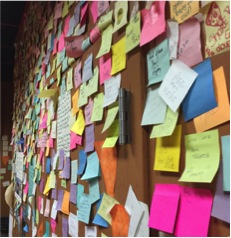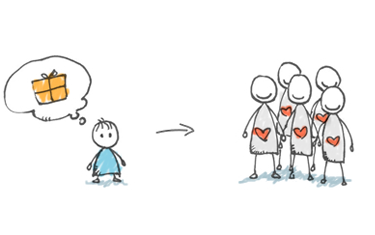
Wall of sticky notes at Rosa’s Fresh Pizza in Philadelphia. Photo: Nate Bronstein
If you walk into the small pizza shop at 25 South 11 Street in Center City Philadelphia, you might be stunned by the mosaic of color filling every inch of its walls.
Upon closer inspection, you will find that what you are looking at isn’t some trendy paint job, but the outward facing display of thousands upon thousands of sticky notes–each with a unique message, prayer, or statement written by a past customer who felt the need to “pay it forward.”
Rosa’s Fresh Pizza is Philadelphia’s only hand-tossed, dollar-a-slice pizza shop and the only pizza shop in the city with a “pay-it-forward” model where customers can buy a pizza slice for someone else. And how do you mark that you’ve made a purchase for someone else? You post a sticky note on the wall.
Businesses in Philadelphia are undergoing a transformation. The line between the for-profit and non-profit sector is blurring as the city sees more businesses working together to give back to their communities. While policy hasn’t caught up just yet, larger collaborations such as “B-corps”–a certification for for-profit businesses whose missions are to serve and support their community–are forming to promote this trend further. Rosa’s Fresh Pizza, founded and run by Mason Wartman, is an example of how businesses give back and are profitable in doing so.
It is appropriate that this trend is happening here. Pennsylvania is home to B Lab, the organization behind the B-corps certification. The certification has a high bar for approval, but currently boasts a roster of over 1,400 companies that agree to work together in redesigning business. B Lab’s mission is to use business to solve a social problem, which can be anything from poverty to educational inequity to environmental sustainability. What B Lab has found is that more and more people today are willing to support and spend their money on social-minded companies.
Wartman first had the idea for his dollar-a-slice pizza shop while he was working as a stock researcher in New York city.
“In New York City, there are $1 slice pizza shops everywhere,” he said. “But in Philly there really isn’t much like that.”
But the “pay-it-forward” aspect of his business wasn’t originally a part of his plan.
“I had a guy come in who wanted to buy a slice for someone in need, he referenced a tradition in Italy where people buy a coffee for someone in advance.”
At Café Sospeso in Naples, Italy, customers can buy a coffee or other low-priced drink for someone in need. To mark the paid-for drink, an empty coffee cup is placed on a counter. When Wartman started his pay-it-forward campaign, he started allowing customers to write notes on sticky notes, and place them all along the walls of his shop.
“We have been feeding about 200 people everyday,” Wartman said, as he pulled a fresh pie out of his ovens in the back. Fighting poverty has always been a passion, he said, and while he didn’t know policy or social work, he did know how to make a good slice of pizza.

A display at Rosa’s Fresh Pizza in Philadelphia. Photo: Nate Bronstein
Wartman’s business is a part of a concept described by University of Pennsylvania’s Dr. Roberta Iverson’s recent work surrounding the “post-work society.” Iverson noted that a merging of a for-profit and non-profit mindset would be necessary for society to advance beyond the simple labor market mindset.
Soon after Wartman started implementing his pay-it-forward campaign, he got some attention on the national scale.
Ellen DeGeneres invited Wartman onto her show in January 2015, and since then business has exploded. Online community sites such as Reddit and Imgur have pushed Wartman’s socially minded business even further.
The dollar-a-slice establishment is an example of how young entrepreneurs are finding ways to support the broader community, proving that social good and profits are not mutually exclusive.
Nate Bronstein is a former teacher from North Philadelphia; he earned his Masters in Education from the University of Pennsylvania and is currently earning his second and third masters in Social Policy and Public Administration respectively.
This story has been published in partnership with the University of Pennsylvania’s School of Social Policy & Practice (SP2). In the run up to the 2016 Presidential Election, the school launched “SP2 Penn Top 10, a comprehensive multimedia initiative in which renowned SP2 faculty members analyze and address the most pressing social justice and policy issues.”
Part of the project, is the creation of stories produced by “SP2 Penn Top 10 Fellows,” graduate students from the School who are trained in solution-based journalism using the Journalism for Social Change curriculum.






